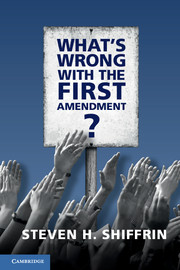9 - Religion
from PART II
Published online by Cambridge University Press: 05 September 2016
Summary
In the previous chapter, I argued that the Court's libertarian approach to speech protection faltered when it was called upon to protect the speech that matters the most. In other words, it casts a blind eye upon the needs of the subordinated, the vulnerable, and the minority. Just as the Court is not sufficiently sensitive to the importance of protecting those who use speech to dissent, the Court is insensitive to those whose religions mark them out as different from others. First, in the absence of malicious intent, the Court has developed a constitutional doctrine that does little to protect religious liberty. In addition, in the system of freedom of expression, the Court permits government speech about religion that marginalizes the nonreligious and those of minority religions. In many of the chapters we considered in Part I, I suggested that better approaches could be found in other Western countries. But here, European approaches in this area are differentiated and disappointing. On the whole, those approaches are somewhat worse than those taken in the United States.
The First Amendment addresses religion in two ways. First, it protects the free exercise of religion. Second, it prohibits the establishment of religion by the state. Taken together, these clauses should protect important values. Ideally, the Free Exercise Clause would stand for religious liberty, particularly freedom of conscience; it also would protect equality by guarding against discrimination on the basis of religion; it would safeguard freedom of religious association, which is vital to many forms of free exercise; it would bind together a strong political community committed to protecting religious freedom. The Establishment Clause should also promote important values many of which are also supported by the Free Exercise Clause.
- Type
- Chapter
- Information
- What's Wrong with the First Amendment , pp. 133 - 156Publisher: Cambridge University PressPrint publication year: 2016

